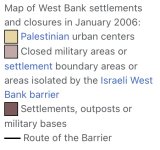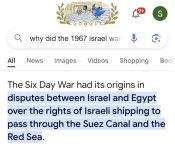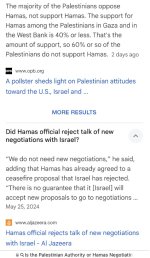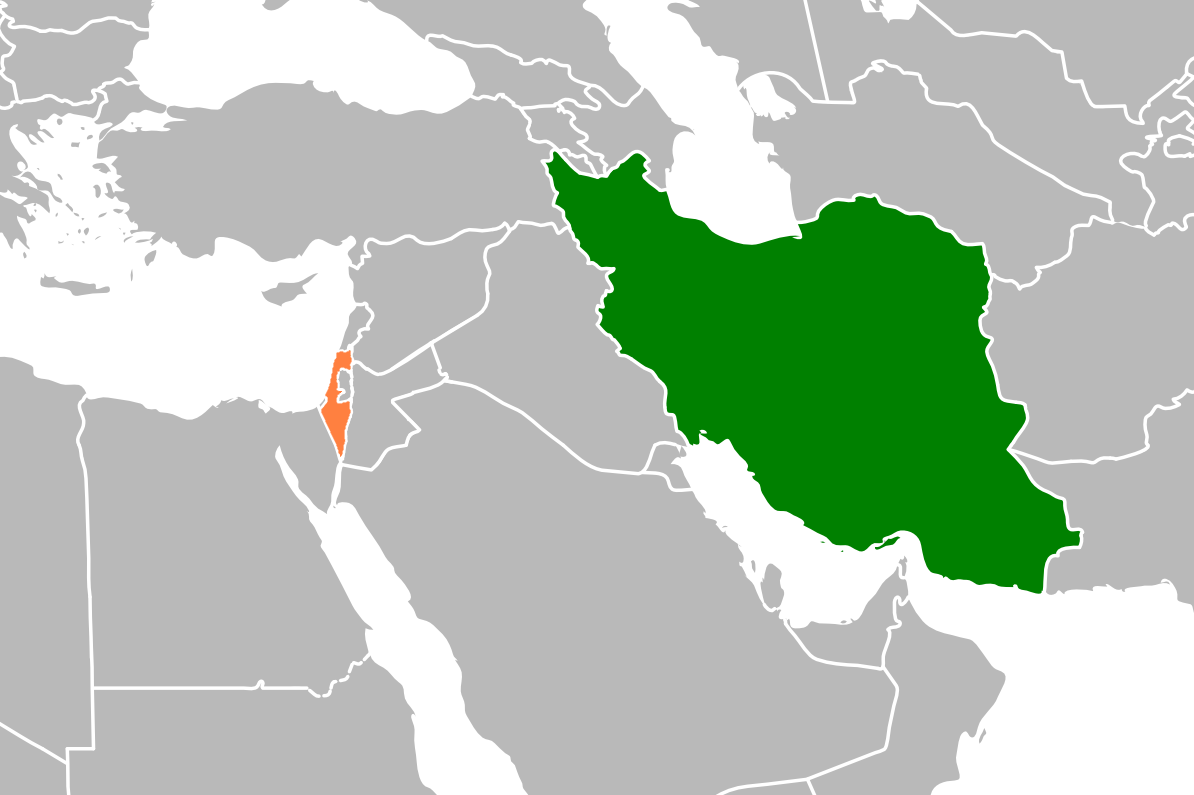So…with this long (4 part, so far) copy&paste, the question that came to mind partway through it was, “When did Israelis start building settlements in the West Bank?” & later that date popped up as 1967. Then the question of “Why?” & a very charged political answer was given. I’m not justifying anything but, “Why where Israelis not trying to build settlements in the West Bank previous to 1967?”
Oh I’m sure…

en.wikipedia.org
So the West Bank and Gaza where under Jordanian & Egyptian rule (not Palestinian) from late in the 1940’s until 1967. Why did Jordan & Egypt occupy (annex, etc…) Gaza & West Bank instead of establishing a Palestine for Palestinians, etc…?


Parts #5 & #6 just popped up, but I’m mid-post so I’ll have to get to those when I get to those…
So why did the 1967 Goat Rodeo happen at all? The one that changed the status of Settlements not being in the West Bank to them happening (Part #7 just popped up)? That seems to be a pivotal time in this 75 year long tiff. What changed in 1967?

Why did Egypt not want Israel to use shipping through the Suez Canal & the Red Sea? Something to do with Gaza & the West Bank? Palestinians?

Well, that’s a…non-Palestinian reason???
The United States and Britain withdrew their financing for the Aswan Dam after Nasser made several moves that appeared friendly to the communist block, including an arms deal with Czechoslovkaia and recognition of the Chinese Government in Beijing.
Without support from the United States and Britain, Nasser needed the revenue generated from tolls collected from ships using the Suez Canal to subsidize the cost of building the dam.
Although the United State was concerned about Nasser's nationalization of the canal, it sought a diplomatic solution to the problem. Britain and France, however, viewed the situation as a threat to their national interests. Accordingly, they sought a military solution that involved Israel.
They secretly contacted the Israeli Government and proposed a joint military operation in which Israel would invade the Sinai and march toward the Suez Canal zone after which Britain and France would issue a warning to both Egypt and Israel to stay away from the Canal. Britain and France would then land paratroopers in the Canal Zone on the pretense of protecting it.
Israel willingly agreed to this scenario since it gave Israel the opportunity to gain control of the Gaza Strip and Sinai Peninsula, end the Egyptian blockade of the Straits of Tiran, and retaliate against Egypt over its support for Palestinian commando raids on Israel's western border during the previous two years? Huh???
(Palestinians & Gaza are finally mentioned! Why are Palestinians doing commando raids into Israel from Egyptian held Gaza though?)
On October 29, 1956, Israeli forces moved across the border, defeated the Egyptian army in the Sinai, captured Sharm al-Sheikh and thereby guaranteed Israeli strategic control over the Straits of Tiran.
Britain and France issued their ultimatum and landed troops, effectively carrying out the agreed upon operation. However, the United States and the Soviet Union responded to events by demanding a cease-fire. (
This sounds familiar…)
In a resolution before the United Nations, the United States also called for the evacuation of Israeli, French, and British forces from Egypt under the supervision of a special United Nations force.
This force arrived in Egypt in mid-November. By December 22, the last British and French troops had withdrawn from Egyptian territory, but Israel kept its troops in Gaza until March 19, 1957, when the United States finally compelled the Israeli Government to withdraw its troops.
The Suez conflict fundamentally altered the regional balance of power. It was a military defeat for Egypt, but Nasser's status grew in the Arab world as the defender of Arab nationalism. Israel withdrew from Egyptian territory gained in the fighting but regained access to the Straits of Tiran, while the United Nations adopted a larger role maintaining a peacekeeping force in the Sinai. Britain and France lost influence in the region and suffered humiliation after the withdrawal of their troops from the Canal Zone.
Moreover, relations between the United States and its British and French allies temporarily deteriorated in the months following the war. In contrast, Soviet influence in the Middle East grew, especially in Syria where the Soviets began to supply arms and advisers to the Syrian military. The United States had played a moderating role, and in so doing had improved its relations with Egypt, but the fundamental disputes between Israel and its neighbors remained unresolved. What a tangled web.
(There was also an issue with the Arab league wanting to dam off 35% of the water flowing into Israel, see “Johnson Plan” and that was ended in 1965, but…that would also deprive Gaza & West Bank of water, but…Shhhh)
Meanwhile, the PLO was attacking Israel from Jordan & the Jordan annexed West Bank because Israel something something Palestinians, etc…no Israeli settlements in the Jordanian annexed West Bank at this point though so Phew!!
Anyway, in 1967, Israeli leaders repeatedly threatened to invade Syria and overthrow the Syrian government if Palestinian guerrilla actions across the border did not cease (because Palestinians?). In that context, the
Soviet Union fed the Syrian government false information in the Spring of 1967 that Israel was planning to invade Syria.
Egypt & Syria had a mutual defence pact. Egypt closed the Straits of Tiran (again) in 1967 cutting off about 90% of Israelis oil imports (‘cuz Palestinians?). The Israeli government asked the U.S. and UK to reopen the Straits of Tiran, as they had guaranteed they would in 1957. That didn’t happen. The Israeli government had worked hard to keep Jordan out of any war; it was concerned about being attacked on multiple fronts, and did not want to have to deal with the Jordanian
West Bank. However, Jordan's King Hussein got caught up in the wave of pan-Arab nationalism preceding the war. Oh well…’cuz Palestinians? Not so much.
Then Jordan signed a mutual defense treaty with Egypt, thereby joining the military alliance already in place between Egypt and Syria. Where’s Lebanon in this future potential Israeli dogpile though?
Nasser (Egypt) proclaimed: "The armies of Egypt, Jordan and Syria are poised on the borders of Israel ... to face the challenge, while standing behind us are the armies of
Iraq,
Algeria,
Kuwait,
Sudan and the whole Arab nation…’cuz Palestinians? Nah…& at the same time several other Arab states not bordering Israel, including Iraq, Sudan, Kuwait and Algeria, began mobilizing their armed forces.
The
Six-Day War, also known as the
June War,
1967 Arab–Israeli War or
Third Arab–Israeli War, was fought between
Israel and a coalition of
Arab states (primarily
Egypt,
Syria, and
Jordan) from 5 to 10 June 1967….& after that point, some Israelis started settlements in the West Bank.
During that Goat Rodeo, Syria-ish lost the Golan Heights, Jordan lost the West Bank, Egypt lost Sinai Peninsula and Gaza Strip, and the Palestinians started to call themselves Palestinians.

At the time of the cessation of hostilities, Israel had seized Syria's
Golan Heights, the
Jordanian-annexed West Bank (including
East Jerusalem), and Egypt's Sinai Peninsula as well as the Egyptian-occupied Gaza Strip. The displacement of civilian populations as a result of the Six-Day War would have long-term consequences, as around 280,000 to 325,000
Palestinians and 100,000 Syrians fled or were expelled from the West Bank and the Golan Heights, respectively.
Again, not justifying things, but the pivot point was 1967 so figuring pointing out what happened, and some of the events & players involved might shed some light on the events going forward from that date…


 On Sept 5-6, 1972, over the course of 20 hours during the Munich Olympic Games, 11 Israeli athletes and coaches were tortured and murdered by the terrorist group, Black September, an affiliate of the Palestine Liberation Organization. For 49 years, this darkest of episodes received no official Olympic commemoration. The victims were eventually honoured for the first time at the opening ceremonies of the 2021 Tokyo Olympics.
On Sept 5-6, 1972, over the course of 20 hours during the Munich Olympic Games, 11 Israeli athletes and coaches were tortured and murdered by the terrorist group, Black September, an affiliate of the Palestine Liberation Organization. For 49 years, this darkest of episodes received no official Olympic commemoration. The victims were eventually honoured for the first time at the opening ceremonies of the 2021 Tokyo Olympics.











